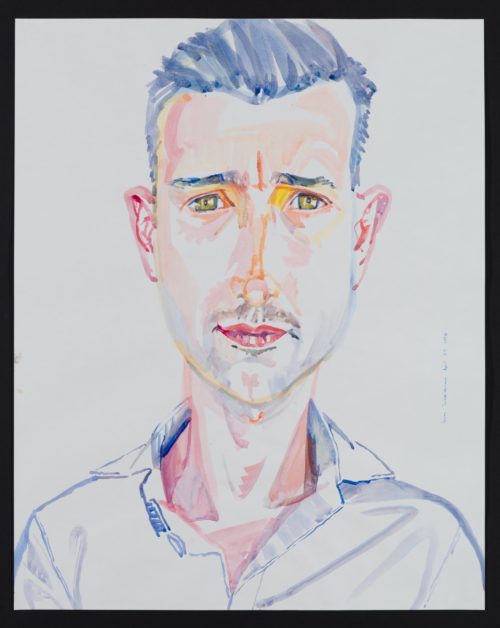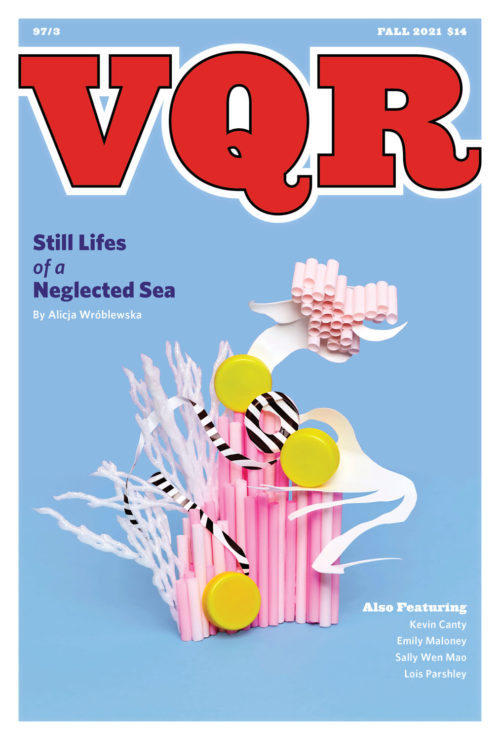I’m writing a play about a Kommandant at Auschwitzwho recognizes one of the Jewish prisonersas a famous poet, and as the Kommandanthas poetic aspirations himself, he pulls the prisoneraway from the work detail to receive poetry lessonsfrom the celebrated Jewish writer. The bulk of the playis their discussions of poetry, which the poetis initially reluctant to have, the power differentialbeing so stark, and though he flatters the Kommandantat first, when he begins to see his Nazi pupil’strue devotion to the art, as well as his untrainedand untapped talent, he goes to work in earnest,and at times they are both simply loversof the German language, though the truth of theirsituation often interrupts. In the last act,the Kommandant is on trial for his crimes,and in the days before he is to be executed,he begs the poet to publish his work under his own name—the Nazi’s writing under the Jew’s name—because as a Nazi, he feels his own name is disgraced,but he believes so strongly in poetry that it mattersmore to him that his work survive than that anyoneknow it was his work. The play is pulled entirelyfrom my imagination, a careful rereadingof Simon Wiesenthal’s The Sunflower, and the poetic ideasof Rilke and Goethe, with a smattering of Nietzsche.In readings of the play, the Kommandanthas seemed more noble than I had intended—in many ways,more noble than the Jew, because the Jew is sufferingby no fault of his own, while the Kommandant is torturedby conscience, and driven by a sense of poetic callingthat separates him from the Germans around him.On the morning of the third workshop reading, I watcheda video of two Russians on an ice-dancing reality showperforming as Jews in Auschwitz. I was sickened,even though I couldn’t follow the pantomimed action,and I wondered if I was producing Holocaust kitsch myself,if my work was as disgusting as theirs, though I knewif I asked any of my team, they would reassure methat I am doing important work that rises to the levelof art. Last night, during a break in the workshop of the play,I told the story of how my grandmother, upon learningthat her entire family had died in the camps,had burned the photo albums of everyone she had loved.I have told that story many, many times,without feeling much more than regret, or sympathy,but this time I broke down crying, and I couldn’t stop.Everyone at the table came to comfort me,and I felt ridiculous, but the only thing I could say was,“It’s time for us to go. This isn’t a place we can live anymore.”I left the studio embarrassed, and later that day,I resigned from the production. I don’t think they believedthat I was serious, and they’ll expect me to show upat the next table reading. I won’t. The play will go onthough I can have nothing more to do with it.This morning, after taking a shirt off the hanger,I looked in the mirror and realized I hadn’t put it on.Without thinking, I had started packing a bag.
Dramaturgy
Feature Date
- February 8, 2022
Series
Selected By
Share This Poem
Print This Poem
Copyright © 2021 by Jason Schneiderman.
All rights reserved.
Reproduced by Poetry Daily with permission.

Don Bachardy
Jason Schneiderman is the author of four books of poems: Hold Me Tight (Red Hen Press 2020) Primary Source (Red Hen Press 2016), winner of the Benjamin Saltman Prize; Striking Surface (Ashland Poetry Press 2010), winner of the Richard Snyder Prize, and Sublimation Point (Four Way Books 2004), a Stahlecker Selection. He edited the anthology Queer: A Reader for Writers (Oxford University Press 2016). His poetry and essays have appeared in numerous journals and anthologies, including American Poetry Review, The Best American Poetry, Poetry London, Grand Street, The Penguin Book of the Sonnet, Story Quarterly, and Tin House. He has received fellowships and awards from Yaddo, The Fine Arts Work Center, The Fulbright Foundation, and the Poetry Society of America. A longtime co-host of the podcast Painted Bride Quarterly Slush Pile, he is an Associate Professor of English at the Borough of Manhattan Community College and teaches in the MFA Program for Writers at Warren Wilson College.

Fall 2021
Charlottesville, Virginia
University of Virginia
Editor
Paul Reyes
Publisher & Executive Editor
Allison Wright
Poetry Editor
Gregory Pardlo
From its inception in prohibition, through depression and war, in prosperity and peace, the Virginia Quarterly Review has been a haven—and home—for the best essayists, fiction writers, and poets, seeking contributors from every section of the United States and abroad. It has not limited itself to any special field. No topic has been alien: literary, public affairs, the arts, history, the economy. If it could be approached through essay or discussion, poetry or prose, VQR has covered it.
Poetry Daily Depends on You
With your support, we make reading the best contemporary poetry a treasured daily experience. Consider a contribution today.



